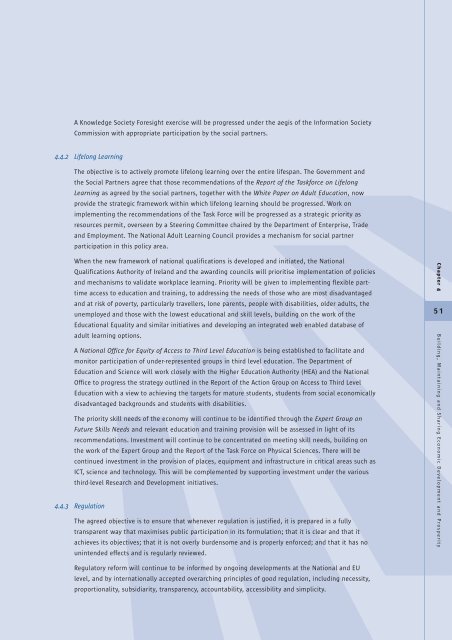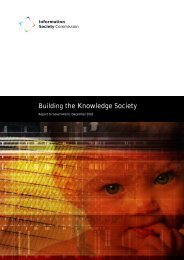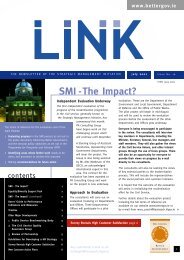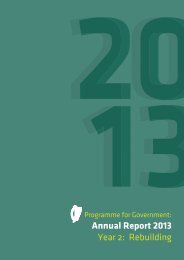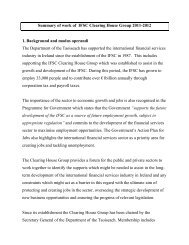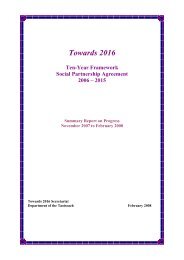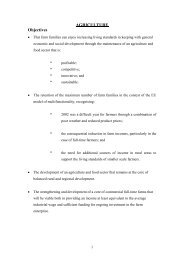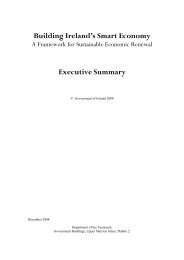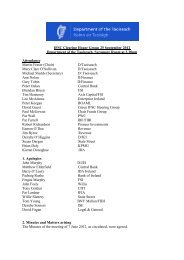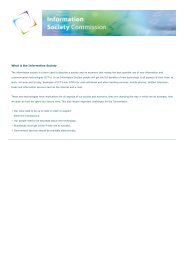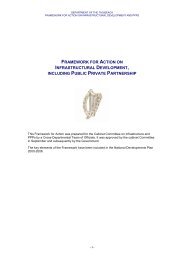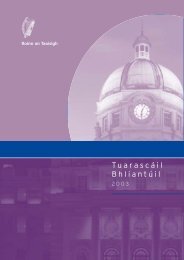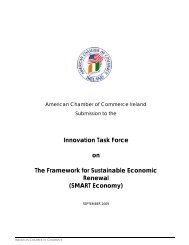Sustaining Progress - Department of Taoiseach
Sustaining Progress - Department of Taoiseach
Sustaining Progress - Department of Taoiseach
Create successful ePaper yourself
Turn your PDF publications into a flip-book with our unique Google optimized e-Paper software.
A Knowledge Society Foresight exercise will be progressed under the aegis <strong>of</strong> the Information Society<br />
Commission with appropriate participation by the social partners.<br />
4.4.2 Lifelong Learning<br />
The objective is to actively promote lifelong learning over the entire lifespan. The Government and<br />
the Social Partners agree that those recommendations <strong>of</strong> the Report <strong>of</strong> the Taskforce on Lifelong<br />
Learning as agreed by the social partners, together with the White Paper on Adult Education, now<br />
provide the strategic framework within which lifelong learning should be progressed. Work on<br />
implementing the recommendations <strong>of</strong> the Task Force will be progressed as a strategic priority as<br />
resources permit, overseen by a Steering Committee chaired by the <strong>Department</strong> <strong>of</strong> Enterprise, Trade<br />
and Employment. The National Adult Learning Council provides a mechanism for social partner<br />
participation in this policy area.<br />
When the new framework <strong>of</strong> national qualifications is developed and initiated, the National<br />
Qualifications Authority <strong>of</strong> Ireland and the awarding councils will prioritise implementation <strong>of</strong> policies<br />
and mechanisms to validate workplace learning. Priority will be given to implementing flexible parttime<br />
access to education and training, to addressing the needs <strong>of</strong> those who are most disadvantaged<br />
and at risk <strong>of</strong> poverty, particularly travellers, lone parents, people with disabilities, older adults, the<br />
unemployed and those with the lowest educational and skill levels, building on the work <strong>of</strong> the<br />
Educational Equality and similar initiatives and developing an integrated web enabled database <strong>of</strong><br />
adult learning options.<br />
A National Office for Equity <strong>of</strong> Access to Third Level Education is being established to facilitate and<br />
monitor participation <strong>of</strong> under-represented groups in third level education. The <strong>Department</strong> <strong>of</strong><br />
Education and Science will work closely with the Higher Education Authority (HEA) and the National<br />
Office to progress the strategy outlined in the Report <strong>of</strong> the Action Group on Access to Third Level<br />
Education with a view to achieving the targets for mature students, students from social economically<br />
disadvantaged backgrounds and students with disabilities.<br />
The priority skill needs <strong>of</strong> the economy will continue to be identified through the Expert Group on<br />
Future Skills Needs and relevant education and training provision will be assessed in light <strong>of</strong> its<br />
recommendations. Investment will continue to be concentrated on meeting skill needs, building on<br />
the work <strong>of</strong> the Expert Group and the Report <strong>of</strong> the Task Force on Physical Sciences. There will be<br />
continued investment in the provision <strong>of</strong> places, equipment and infrastructure in critical areas such as<br />
ICT, science and technology. This will be complemented by supporting investment under the various<br />
third-level Research and Development initiatives.<br />
4.4.3 Regulation<br />
The agreed objective is to ensure that whenever regulation is justified, it is prepared in a fully<br />
transparent way that maximises public participation in its formulation; that it is clear and that it<br />
achieves its objectives; that it is not overly burdensome and is properly enforced; and that it has no<br />
unintended effects and is regularly reviewed.<br />
Regulatory reform will continue to be informed by ongoing developments at the National and EU<br />
level, and by internationally accepted overarching principles <strong>of</strong> good regulation, including necessity,<br />
proportionality, subsidiarity, transparency, accountability, accessibility and simplicity.<br />
Chapter 4 Building, Maintaining and Sharing Economic Development and Prosperity<br />
51


